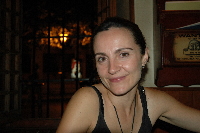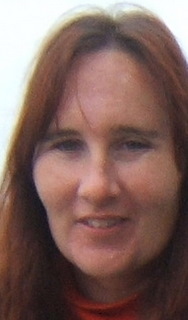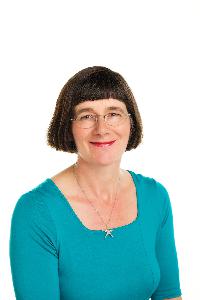Off topic: Translation skills passed on to next generations Thread poster: Elena Robles Sanjuan
|
|---|
Good morning to all,
I have a child at Primary School who´s struggling with Mathematics pretty badly this year, just like I did when I was his age. When I sit down with him and help him with his homework, I realise that, in both our cases, the struggle with Mathematics has nothing to do with being more or less intelligent. We simply don´t have the ability to interpret the world through science that other people have.
For us, words, expressions, feelings, sensitivity, languag... See more Good morning to all,
I have a child at Primary School who´s struggling with Mathematics pretty badly this year, just like I did when I was his age. When I sit down with him and help him with his homework, I realise that, in both our cases, the struggle with Mathematics has nothing to do with being more or less intelligent. We simply don´t have the ability to interpret the world through science that other people have.
For us, words, expressions, feelings, sensitivity, language, culture...those are the key issues in life. Don´t get me wrong, I don´t mean people with scientific skills don´t feel the need for any of those things. And I certainly believe in science as the cornerstone of our existence.
Whilst I am very resentlful towards the educational system we have in Spain, where you are still forced to decide whether science (and only science) is the smartest choice for the future or not, I feel I´d be delighted if one of my children were prone to choose linguistics, translation, language teaching...and this is what I instill in them.
But I wonder if it´s still safe to let them choose, even though ours is a technology-driven world. Will my children be allowed to enjoy a certain degree of "romanticism" for language studies if that is their choice or will they have to become so commercially-minded that they´ll miss out on the beauty of just reflecting on the meaning of a word?. ▲ Collapse
| | | | Mats Wiman 
Sweden
Local time: 19:14
Member (2000)
German to Swedish
+ ...
In memoriam | Let your children go for it! | Mar 5, 2008 |
Dear Elena,
I believe that following one's 'genius' is the best advice you can get in order to get an interesting and rewarding life, meybe even financially!
From a purely objective point of view, in an increasingly globalised world, persons with language skills and, in particular, lanuage taching skills, will meet a constantly growing market, in need of people with such talents.
Yes, digitalised computer translation technology will develop into some sort o... See more Dear Elena,
I believe that following one's 'genius' is the best advice you can get in order to get an interesting and rewarding life, meybe even financially!
From a purely objective point of view, in an increasingly globalised world, persons with language skills and, in particular, lanuage taching skills, will meet a constantly growing market, in need of people with such talents.
Yes, digitalised computer translation technology will develop into some sort of fruition but that (lucky for us) is still far away (try one of them and become entertained!).
Even if and when they have got a place in the translation world, they will most certainly be used mainly be used for simpler tasks and larger volumes being printed or used in/on computer screens.
For oral communication, especially in more sophisticated areas like interviews, negotiations, films, musiv etc. a gifted humena being will be necessary.
Choosing something that is interesting is always rewarding and also one of the best vocational choice compasses that one can use IMHO.
I believ I have lived it and I do not regret it in the least, on the contarry (well, I could be more affluent ...)
best regards
Mats Wiman ▲ Collapse
| | | | Parrot 
Spain
Local time: 19:14
Spanish to English
+ ...
| It all depends on focus | Mar 5, 2008 |
I'd refocus the question, if I were you. Many times it's all a matter of approach. Children don't come into the world with prejudices and can simply be put off by traumatic experiences, a mentor's failure to relate his science (in the broadest sense of the term) to other branches of knowledge at large, or simply a lack of sense or purpose in an assignment. I rejected maths myself until I discovered equations were simply another language -- and conversely, language studies lent themselves to math... See more I'd refocus the question, if I were you. Many times it's all a matter of approach. Children don't come into the world with prejudices and can simply be put off by traumatic experiences, a mentor's failure to relate his science (in the broadest sense of the term) to other branches of knowledge at large, or simply a lack of sense or purpose in an assignment. I rejected maths myself until I discovered equations were simply another language -- and conversely, language studies lent themselves to mathematical operations. When, later on, it was explained that maths could construct 3-D models more logical and more stable than sculptural experiments, that they could transpose into musical lines and had a history and theory of their own, it made a big difference. But in a compartmentalised world with educational targets, designed to follow whatever the "trend" is (so-called modern maths, an algebra or trigonometry requirement, etc.) this is not a priority, and it takes a different kind of teacher to be able to communicate the excitement of a holistic vision.
Ask yourself how Pythagoras or Plato would've explained it. Or read Newton, who was a great writer. Part of the beauty of exploring this level of genius lies in the fact that they made the subject comprehensible and restored its links to the very cosmos.
Otherwise, it may seem that "science" as it is taught has a very short memory. It gets excited about its "most recent" and forgets, or overwrites, its debt to an entire history of evolution. Many "discoveries" are simply rediscoveries, and the "discoverers" have more than once laughed off "superstitions" that were once based on equally empirical observations.
 ▲ Collapse
| | | | | Encourage him to go for what he's good at | Mar 5, 2008 |
Elena Robles Sanjuan wrote:
Good morning to all,
I have a child at Primary School who´s struggling with Mathematics pretty badly this year, just like I did when I was his age. When I sit down with him and help him with his homework, I realise that, in both our cases, the struggle with Mathematics has nothing to do with being more or less intelligent. We simply don´t have the ability to interpret the world through science that other people have.
For us, words, expressions, feelings, sensitivity, language, culture...those are the key issues in life. Don´t get me wrong, I don´t mean people with scientific skills don´t feel the need for any of those things. And I certainly believe in science as the cornerstone of our existence.
Whilst I am very resentlful towards the educational system we have in Spain, where you are still forced to decide whether science (and only science) is the smartest choice for the future or not, I feel I´d be delighted if one of my children were prone to choose linguistics, translation, language teaching...and this is what I instill in them.
But I wonder if it´s still safe to let them choose, even though ours is a technology-driven world. Will my children be allowed to enjoy a certain degree of "romanticism" for language studies if that is their choice or will they have to become so commercially-minded that they´ll miss out on the beauty of just reflecting on the meaning of a word?.
I know it's difficult when schools insist on children choosing subjects at a very early age, but if your son seems to have the "language gift", I think you should encourage him. Perhaps you can spend some extra time with him examining languages, reading a simple foreign language book, singing foreign songs, and so on, as well as helping with his maths homework. Incidentally, in my experience (as a one-time teacher of languages and as an ungifted failure at maths), teachers who are too expert in their own subject find it hard to understand and sympathise with pupils who are not gifted in that subject. Someone who understands how mysterious maths (or a foreign language) seem to some of us can make a better teacher.
Both my parents were linguists and part-time translators, and my son is a full-time translator, like me (different language pairs), so I think there is definitely an inherited aptitude for languages in some people, as there is for maths, music, sport, and so on.
Best wishes,
Jenny
[Edited at 2008-03-05 11:48]
| | |
|
|
|
| Children will surprise you | Mar 5, 2008 |
On the one hand, I think it is great to provide a home environment where your child can pursue an interest in language arts and share that passion of yours with him. On the other hand, kids will surprise you as they grow older and develop their own passions. Don't be surprised if there comes a day when your child decides to develop an interest in something completely different as a way to differentiate himself from you. And don't be surprised if at some point the concepts he's struggling with in... See more On the one hand, I think it is great to provide a home environment where your child can pursue an interest in language arts and share that passion of yours with him. On the other hand, kids will surprise you as they grow older and develop their own passions. Don't be surprised if there comes a day when your child decides to develop an interest in something completely different as a way to differentiate himself from you. And don't be surprised if at some point the concepts he's struggling with in math and so on start to "click" (and in that regard, be careful not to give off the impression that "math is hard").
My son took a very long time to learn to read comfortably, and had terrible writing mechanics as well! But lately (he is 13) he has started to blossom in that area, and it's probably one of his favorite traditional subjects.
I do think there will always be a professional niche for those who have a passion for the language arts. However, I also think there comes a time when it's important to insert a voice of practicality when talking to kids about career paths. If anything, 15-16-17-18 year olds can be *too* romantic and wind up following the subject matters they love but that don't necessarily lead to a career that either pays the bills or that involves doing the things that they loved about their school coursework (i.e., I know/knew a lot of liberal arts majors who either had a hard time finding a job, period, or who wound up doing things like becoming technical writers and editors producing training manuals for nuclear submarines or working in corporate communications).
For example, my son's biggest passion right now is violin, which is something I enthusiastically support. My mother is a musician, and I was deeply involved in music myself in grade school and high school. I encourage him in this interest, but I also try to open his eyes to careers connected to the music world other than being a performing artist or teacher--such as recording engineer. ▲ Collapse
| | | | mjbjosh
Local time: 19:14
English to Latvian
+ ...
| Languages = Maths?? | Mar 5, 2008 |
After reading some psychology books, I was very surprised to learn that the same people who are good in languages should be doing very well in maths as well, because these are said to be just two different forms of a code for something. I was quite surprised, because when growing up I was really good at languages, but not necessarily in maths. I was OK though. But as far as I know, there seems to be some kind of connection between both. Maybe I was an exception LOL
[Edited at 2008-... See more After reading some psychology books, I was very surprised to learn that the same people who are good in languages should be doing very well in maths as well, because these are said to be just two different forms of a code for something. I was quite surprised, because when growing up I was really good at languages, but not necessarily in maths. I was OK though. But as far as I know, there seems to be some kind of connection between both. Maybe I was an exception LOL
[Edited at 2008-03-05 15:11] ▲ Collapse
| | | | Claire Cox
United Kingdom
Local time: 18:14
French to English
+ ...
| Definite linguistic/mathematical bent | Mar 6, 2008 |
I think people tend to have a talent for languages or a talent for Maths and you're either disposed that way or you're not. I've always loved languages and everything to do with them, and I struggled at Maths, although I did end up in the top set at school and went on to do A-level - heaven knows why. Well actually, I do know - I was set on French and German and really wanted to do Chemistry too, which I loved. As it was a relatively small sixth form in a grammar school in the '70s, combining la... See more I think people tend to have a talent for languages or a talent for Maths and you're either disposed that way or you're not. I've always loved languages and everything to do with them, and I struggled at Maths, although I did end up in the top set at school and went on to do A-level - heaven knows why. Well actually, I do know - I was set on French and German and really wanted to do Chemistry too, which I loved. As it was a relatively small sixth form in a grammar school in the '70s, combining languages and science was unheard of, so Maths was the next best thing. I passed, but only with an average grade and can still remember that glazed feeling as my boyfriend/teachers tried to explain basic concepts to me... I can see the same expression on my sons' faces now, unfortunately, so yes, it probably is inherited! One of my sons has inherited my talent for languages, whereas the other is defiantly anti-foreign languages (great joy when he moved school in his GCSE year and found he no longer had to do French!). He can't even reproduce the sounds he hears, whereas my younger son has a really good ear. Fascinating stuff. I also discovered that one of my grandfather's aunts had been a translator many moons ago, so there's obviously a genetic pattern there somewhere. My sister also studied languages at university and her daughter has a definite gift too.
Back to Maths, though - I do believe that the right teachers can make all the difference. I had a couple of brilliant teachers at crucial times and I think they made the difference between muddling along and getting into the top set. I don't think the same applies to languages - I think you have to have that gift in the first place. ▲ Collapse
| | | | | Peace of mind | Mar 7, 2008 |
Thank you very much to all of you for such interesting comments. I feel more relaxed and ready to let my children be just the way they are...
| | | | To report site rules violations or get help, contact a site moderator: You can also contact site staff by submitting a support request » Translation skills passed on to next generations | Anycount & Translation Office 3000 | Translation Office 3000
Translation Office 3000 is an advanced accounting tool for freelance translators and small agencies. TO3000 easily and seamlessly integrates with the business life of professional freelance translators.
More info » |
| | CafeTran Espresso | You've never met a CAT tool this clever!
Translate faster & easier, using a sophisticated CAT tool built by a translator / developer.
Accept jobs from clients who use Trados, MemoQ, Wordfast & major CAT tools.
Download and start using CafeTran Espresso -- for free
Buy now! » |
|
| | | | X Sign in to your ProZ.com account... | | | | | |










